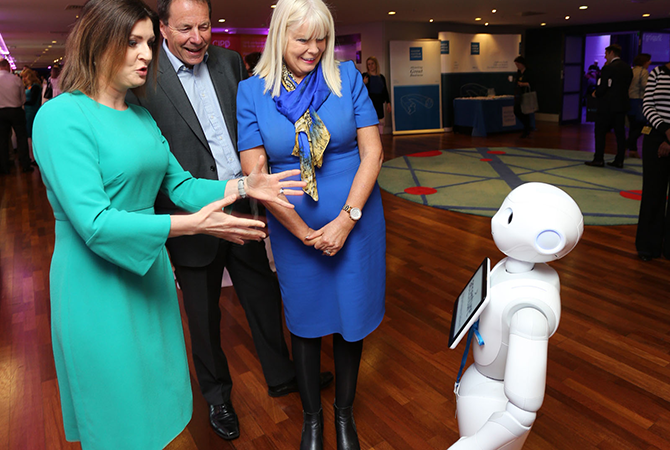How can the challenges of economic and political disruption be used to shape a more human future of work? This was the overarching theme of the CIPD’s Annual Conference in Dublin last week, introduced by Mary Connaughton, Director, CIPD Ireland. Throughout the day, delegates discussed how HR should behave and lead in volatile times and they were prompted to draw on principles and behaviours to connect the CIPD’s vision to practical actions that will shape future workplaces.
The CIPD engages with the Irish Government on major national policy issues and was pleased to have Mary Mitchell O'Connor TD, Minister for Jobs, Enterprise and Innovation, open the Conference. The Minister talked about the Government’s focus on jobs and skills, and the challenges posed by Brexit. She addressed the initiatives to build skills and grow apprenticeships, and the role the HR profession and employers have to play in developing employees for changing jobs and work.
CIPD Chief Executive, Peter Cheese, took to the platform to talk about:
- the forces shaping the future of work
- the changing context of work, workforce and workplace
- the effects of social and demographic change, globalisation and technology.
Cheese challenged delegates to consider what it means to be a professional and questioned whether current people management practices are fit for purpose. In line with the CIPD’s Profession for the Future strategy, he called for HR to move away from a reliance on rigid rules to principles-led decision-making.
Paolo Gallo of the World Economic Forum charmed delegates with the analogy he drew between the disruption that created Frankenstein, and the disruption that the current fourth industrial revolution is causing. He questioned whether the revolution could not just change our responses to the world, but fundamentally change us as humans. He claimed that two hundred years later, the ‘Frankenstein’ questions remain valid:
- Are we learning?
- Which choices are we making?
- What is our moral compass?
Gallo set up the day to focus on leadership responsibility, and he posed the question: ‘what are we going to do to improve the state of the world?’

Further inspiring insights came from Clare Dillon of Microsoft, who said we’re already living with artificial intelligence and dared everyone to think of themselves as a ‘newbie’ to ensure continuous learning becomes the new norm rather than the latest fad.
Teacher and advocate Sinéad Burke, aka Minnie Mélange, gave a moving perspective on inclusivity – having the openness to see the world through different lenses and allowing different voices to emerge. These insights contributed to interesting round table and panel discussions on how to develop a more human future of work, pulled together by Peter Cheese sharing the CIPD’s set of professional principles for the future.
Jarath Dooley of Version 1, which won the CIPD 2017 Award for Employee Empowerment and Trust, talked about the centrality of Version 1’s core values and the strategic triangle of employees, customers and profitability. The company is maximising engagement opportunities into the future with a balanced, values-based approach that drives performance.
Additionally, delegates benefited from hearing thought leaders’ views on other topical issues that the profession is currently grappling with. With the gig economy moving centre stage, Melanie Crowley of Mason Hayes Curran shared her evaluation on how to manage independent workers into the future, and minimise the legal risks.
Liz Joyce of the Central Bank, talked about creating a sustainable future-fit culture. Joyce discussed the development of a role-based organisation, with dual career paths, and greater spans of control. The Bank is building new organisational capabilities and has launched a new future-fit working environment to facilitate behaviours such as collaboration.
On employee well-being, Dr Wolfgang Sidle of Mercer argued for increasing attention on maintaining the health of the majority of the workforce, not just those who are unwell, recognising that many people demonstrate unhealthy behaviours. He debated how to better measure the return on value, not just return on investment for well-being.
In the context of current high profile leadership crises, Elena Antonacopoulou of the University of Liverpool, talked about how to better connect the practice of learning and leadership. Antonacopoulou urged her audience to embrace the unknown and anticipate crises in order to pinpoint the capabilities and talents people will need to be able to respond effectively.
This thought-provoking conference gave delegates the unique opportunity to come together and contribute to the important discussions the profession needs to have around the core principles and behaviours needed to shape a more human future of work. To engage further with the debates raised at the conference on shaping the future of work, email CIPD in Ireland and join the discussion in the CIPD Community.
Media centre
Are you a journalist looking for expert commentary and insights on the world of work?

Championing better work and working lives
About the CIPD
At the CIPD, we champion better work and working lives. We help organisations to thrive by focusing on their people, supporting economies and society for the future. We lead debate as the voice for everyone wanting a better world of work.





